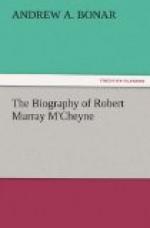But these helps in study were all the while no more than supplementary. The regular systematic studies of the Hall furnished the main provision for his mental culture. Under Dr. Chalmers for Divinity, and under Dr. Welsh for Church History, a course of four years afforded no ordinary advantages for enlarging the understanding. New fields of thought were daily opened up. His notes and his diary testify that he endeavored to retain what he heard, and that he used to read as much of the books recommended by the professors as his time enabled him to overtake. Many years after, he thankfully called to mind lessons that had been taught in these classes. Riding one day with Mr. Hamilton (now of Regent Square, London) from Abernyte to Dundee, they were led to speak of the best mode of dividing a sermon. “I used,” said he, “to despise Dr. Welsh’s rules at the time I heard him; but now I feel I must use them, for nothing is more needful for making a sermon memorable and impressive than a logical arrangement.”
His intellectual powers were of a high order: clear and distinct apprehension of his subject, and felicitous illustration, characterized him among all his companions. To an eager desire for wide acquaintance with truth in all its departments, and a memory strong and accurate in retaining what he found, there was added a remarkable candor in examining what claimed to be the truth. He had also an ingenious and enterprising mind—a mind that could carry out what was suggested, when it did not strike out new light for itself. He possessed great powers of analysis; often his judgment discovered singular discrimination. His imagination seldom sought out object of grandeur; for, as a friend has truly said of him, “he had a kind and quiet eye, which found out the living and beautiful in nature, rather than the majestic and sublime.”




